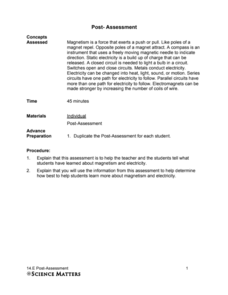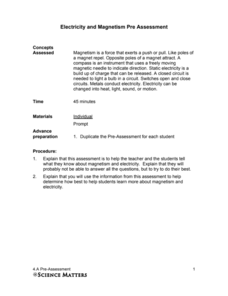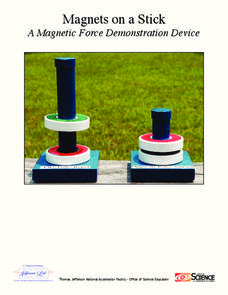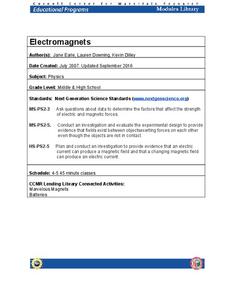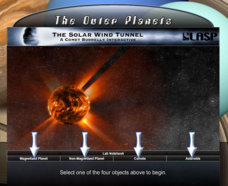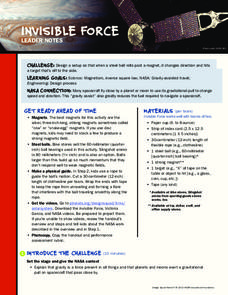Rice University
College Physics for AP® Courses
Take a look at an organized physics course. The 34-section electronic textbook covers material in AP® Physics 1 and 2. Teachers use the text to supplement lectures and have the class work through the labs. Each section contains multiple...
CPO Science
Physics Skill and Practice Worksheets
Stop wasting energy searching for physics resources, this comprehensive collection of worksheets has you covered. Starting with introductions to the scientific method, dimensional analysis, and graphing data, these skills practice...
Curated OER
Typical Conceptual Questions for Physics I - Waves, Electricity, and Magnetism
This wave and electromagnetism assignment is so thorough, it could be used as a unit exam. The first section of it covers wave concepts. The next section addresses static electricity. There is a section that deals with electric circuits....
Curated OER
Fish and Clips
Youngsters test magnetic strength by measuring the mass of paper clips that they "hook" with a magnet. Your first and second graders should love the hands-on activities associated with this plan. The reproducible materials are quite good...
Science Matters
Post Assessment: Magnetism and Electricity
Time to know what they know! The final installment of a 14-lesson unit assesses the class's understanding of magnetism and electricity concepts. Items include both multiple-choice and open-ended questions on magnetic fields, electric...
Science Matters
Electromagnets
Classes are sure to get all wrapped up in an attractive lesson! Young scientists learn how to combine electricity and magnetism as they create electromagnets. They create their own electromagnets and collect data on their strength as...
Science Matters
Electricity and Magnetism Formative Assessment #2
Leave it to science to get scholars out of a jam. Young scientists use what they've learned about electricity and magnetism in the previous eight lessons in the series to build tools that will allow them to find their way out of the...
Science Matters
Magnetic Fields: The Earth Acts as a Giant Magnet
Attract learners to an interesting lesson! The third in a 14-part series of lessons on electricity and magnetism uses a hands-on approach to exploring magnetic fields. Scholars experiment with a compass to test Earth's magnetic field and...
Science Matters
Electricity and Magnetism Pre-Assessment
How much do your classes know about electricity and magnetism? A complete elementary unit on the topic begins with a pre-assessment to gauge their understanding prior to instruction. Items include questions about the properties of...
Utah Education Network (UEN)
Utah Open Textbook: 7th Grade Science
Physical and biological factors affect everyday living. Scholars explore electromagnetic forces, motion, the rock cycle, and geological changes. They examine cells as the building blocks of life and how organisms reproduce using images...
Utah Education Network (UEN)
Utah Open Textbook: 5th Grade Science
How do Earth's changes affect humans? Pupils learn about physical and chemical changes on Earth and how they lead to erosion, earthquakes, and volcanoes. Using the text, they also explore the concepts of electricity and magnetism by...
Physics Classroom
Charge Interactions
Has your class been repelled by your previous magnetism lesson plan? Try a fun interactive instead! The activity, part of the Static Electricity series, challenges scholars to infer the charges of a group of magnets based upon their...
US Department of Energy
Magnets on a Stick: A Magnetic Force Demonstration Device
Why do some magnets attract while others repel? Scholars use clearly labeled permanent magnets to explore the attractive question. They compare the behavior of like versus opposite poles to find the answer.
DiscoverE
Levitating Train
Levitation isn't just for magicians. Pupils design and build a small portion of track for a maglev train using magnets and Lego bricks. The goal is to get the trains to levitate—without using magic!
Cornell University
Electromagnets
Discover the connection between electric current and magnets. Scholars create electromagnets by passing a magnet through a coil. They experiment with different materials to determine the variables that affect the strength of the current.
Concord Consortium
Opposites Attract
Whether they pull together or push away from one another, magnets are sure-fire pupil pleasers! Take their study of magnetism to a new level with a fun interactive. Individuals control the polarity of two spheres to observe attractive or...
CK-12 Foundation
Galvanometer
In 1820, Hans Christian Orstead discovered the link between electricity and magnetism, which allows us to measure current and voltage. The simulation allows scholars to observe the inner workings of an ammeter and voltmeter as they...
CK-12 Foundation
Telegraph
Most pupils don't know what a telegraph is, much less how one works. A secret simulation has scholars pick the size of the primary and secondary loops, the battery voltage, and which letters in the Morse Code they want to transmit. They...
Laboratory for Atmospheric and Space Physics
The Solar Wind Tunnel
The winds of change are blowing in our very own solar system! But what makes some heavenly bodies more affected by solar winds than others? Pupils discover the concept of magnetic forces at work in space in this attractive interactive,...
Bowels Physics
Magnetic Fields and Forces
Every knows that opposites attract! Here's a presentation that uses this background knowledge to explain magnetic fields and forces. The resource also explains the shape of magnetic fields and how to determine the direction of forces.
PBS
Invisible Force
Investigate invisible forces. Young engineers design a setup that changes the direction of a steel ball using a magnetic force. The purpose of the setup is to model the gravitational pull of spacecraft by planetary bodies.
PBS
Inspector Detector
How do spacecraft detect magnetic fields? The fourth installment of a five-part unit has learners develop a device with magnets that allows for the detection of magnetic fields. They use a map of an imaginary planet to try out their...
Urbana School District
Magnetism
The compass was first used in 206 B.C., but we didn't discover magnetic poles until 1263 A.D. Presentation begins with the history of magnetism before continuing on to magnetic fields, magnetic forces, electromagnets, currents,...
Teach Engineering
Magnetic Fluids
Teams work as material engineers to create ferrofluids, whose shape is influenced by magnetic fields. The activity, which is the fourth in the six-part series, has the teams create magnetic ink and use it to write, testing it with a...






